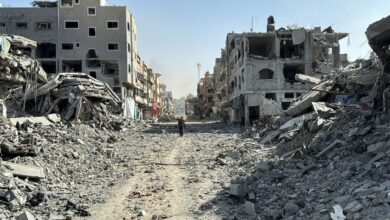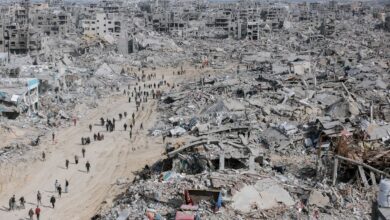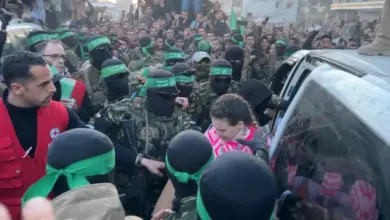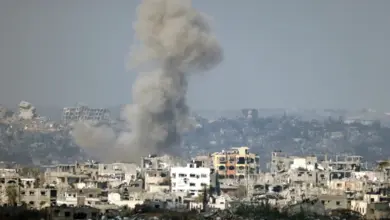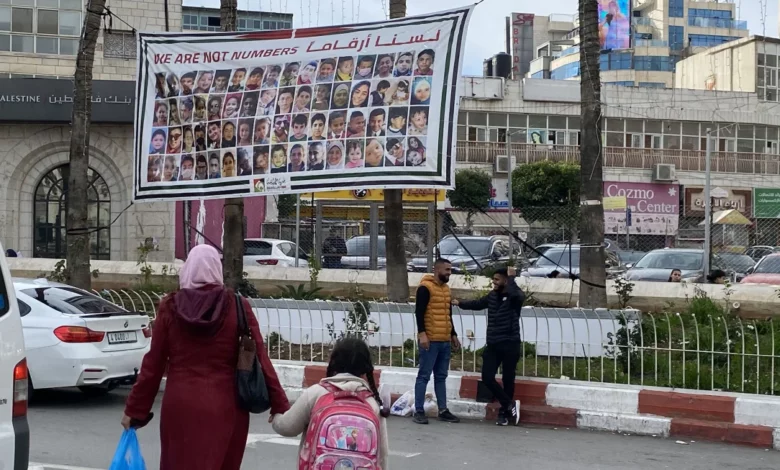
If Ramallah has a center, it is Al-Manara Square. Six roads meet here, and pedestrians weave their way confidently across the tight roundabout, forcing cars to make way. It is always busy.
Demonstrators will rally here to protest, but when CNN visited on a Sunday morning, people were going about their business. All the same, photos from the war in Gaza posted in the square and hung on banners and fences remind anyone who needs reminding of the horrors unfolding not far away.
“This destruction resembles the conscience of the world,” reads one poster, under a picture of rescue workers clearing rubble.
Another photograph shows ambulances outside a hospital with the text, “Medical Heroes demand action: Stop the Massacre in Gaza!”
At his office about a mile away, where desks and shelves groan under piles of paperwork, Khalil Shikaki is thinking about the conflict.
Palestinians, he says, overwhelmingly support the Hamas decision to go to war with Israel.
His research company, the Palestinian Center for Policy and Survey Research (PCPSR), has just published the findings of its latest survey into Palestinian attitudes.
Seven hundred and fifty adults were interviewed face to face in the West Bank, and 481 were interviewed in Gaza, also in person. The Gaza data collection was done during the recent truce, when it was safer for researchers to move about.
The survey, which has a four-point margin of error (rather than the usual three-point), found that almost three-quarters (72 percent) of all respondents believe Hamas’s decision to launch its attack on Israel on October 7 was “correct.”
Less than a quarter (22 percent) said it was “incorrect.”
But that doesn’t mean support for atrocities, he adds. “No one should see this as support for any atrocities that might have been committed by Hamas on that day.”

“Palestinians believe that diplomacy and negotiations are not an option available to them, that only violence and armed struggle is the means to end the siege and blockade over Gaza, and in general to end the Israeli occupation,” Shikaki said.
This important distinction is teased out by three of the poll’s data points. Almost 80 percent of respondents told PCPSR researchers that killing women and children in their homes is a war crime.
An even higher number (85 percent) of respondents said they had not watched videos shown by international news outlets of acts committed by Hamas on October 7 – a figure which may hint at why only 10 percent of those surveyed said they believed Hamas had committed war crimes that day.
To a considerable extent, Palestinians, just like Israelis, are getting a skewed perspective from their media. In addition to this bubble effect, Shikaki says, there might also be a desire to avoid other sources to maintain deniability. Denial, as he says, is useful during periods of stress and pain.
Polling in a war zone comes with difficulties even in the lulls. Interviewing people in the center and south of the enclave was relatively straightforward as most were still at home, but surveying people from the north of Gaza was partially compromised because so many had been displaced to shelters.
Separated territories, divergent attitudes
Gaza and the West Bank, what are now called the Palestinian territories, have been geographically separated since 1948. Recent decades have seen that separation take root between the two populations, not least because it has become harder and harder for Palestinians to move between the territories.
Since 2005, when Israel moved its soldiers and settlers out of Gaza and essentially sealed off the territory with help from Egypt, the day-to-day experiences of Palestinians in Gaza have diverged even further from those of Palestinians in the West Bank.
Politically, the territories are split. The Palestinian Authority under aging President Mahmoud Abbas has partial control over the West Bank, while Hamas controls what goes on inside Gaza – or it did until Israel invaded.
These differences are reflected across the attitudes surveyed, in particular, on the use of violence.

In Gaza, support for armed struggle has risen only slightly from 50 percent in September 2022 (a year before the current war) to 56 percent in December 2023. In the West Bank, however, support has been rising dramatically from 35 percent in September 2022 to 54 percent in September 2023 (a month before the war). This month, polled support for armed struggle reached 68 percent in the West Bank.
Shikaki says these divergences reflect the rise in attacks by violent Jewish settlers on Palestinians in the West Bank, which have drawn condemnation from the US and Europe, along with the pervasive sense that Israel’s current hard-right government is not overly perturbed by that state of affairs.
Hamas, unsurprisingly perhaps, finds growing support, especially among West Bank Palestinians. Backing for the militant group as a political party has increased there nearly four-fold (from 12 percent to 44 percent) in the three months between September 2023 and December 2023.
In besieged Gaza, by contrast, support has remained relatively stable with 38 percent support in September and 42 percent in December.
Fatah, the secular-nationalist party of Palestinian Authority (PA) President Abbas, which led the Palestine Liberation Organization to its historic agreements with Israel in the 1990s — which created the PA but crucially did not get around to solving some of the conflict’s most fundamental issues — has seen its support fall across the territories from 26 percent three months ago to 17 percent now.
Support for Abbas himself is even lower – so low, in fact, that he is seen as almost entirely discredited.
Out of denial, towards a reckoning?
But Shikaki cautions that higher support for Hamas should not be over-stated, at least not yet. As more Palestinians come to terms with the atrocities committed by Hamas on October 7, so attitudes could change — though that is unlikely to be the case so long as Gaza remains under massive attack.
Important again is how many people have watched videos from October 7 and the differences between the territories. In Gaza, 25 percent of those asked said they had viewed such videos; and 16 percent of all respondents told researchers Hamas had committed war crimes. In the West Bank, the corresponding numbers were just 7 percent and 1 percent.
Gaza is moving out of denial more quickly than the West Bank, Shikaki says, and that means a reckoning for Hamas. Already, only 38 percent of Gazans want to see the militant group return to governance after the war.

But it is not just greater awareness of events on a single day that matter. It is also what happens when politics resumes when the war is over, and whether Palestinians see any sort of political horizon.
At a time when people believe the only way to get Israel to end the occupation is by inflicting pain and suffering on Israelis, Palestinians see Hamas as the party most capable of delivering violence effectively, Shikaki says.
On the other hand, “if and when you give the Palestinians the option of negotiating a permanent end to Israeli occupation and the creation of a Palestinian state … support for Hamas will probably decline to below where it was before the war,” he says.
Support for the two-state solution has remained largely stable across Gaza and the West Bank over the past three months, moving from 32 percent to 34 percent, but historically, those figures are still low. In the past, PCPSR polling has shown support for the existence of an independent Palestine sitting next to the state of Israel at between 70 percent and 80 percent.
US President Joe Biden has sought to convince both Israelis and the Palestinians that he sees negotiations as important, saying last month, “I don’t think (the conflict) ultimately ends until there is a two-state solution.” The problem is, Palestinians do not seem to believe him. Nearly three-quarters (70 percent) of respondents said they do not regard US talk about Palestinian statehood as serious.
Shikaki says it is obvious why this is so.
“Since you have all that power, people are not going to believe you if you say, well, I can’t use leverage against Israel. So, the conclusion is you are paying lip service to the two-state solution, but you have absolutely no intention of doing anything to make it a reality.”

